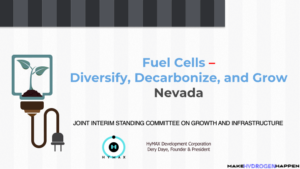HyMAX Development Corporation President Dery Daye presented to the Nevada State Legislature Joint Standing Committee on Growth and Infrastructure the company’s “Fuel Cells – Diversify, Decarbonize, and Grow Nevada” initiative on May 29.
As part of action required by SB451, the 2023 law directing the interim committee to conduct a study concerning subjects relating to hydrogen, Mr. Daye offered legislators a perspective as a professional with expertise regarding the development of hydrogen technologies and as the founder of HyMAX Development Corporation (HDC), a startup looking to develop hydrogen end-uses. HDC’s mission as laid out in oral opening remarks is “to create clean energy options for everyone, put a spotlight on ‘sacrifice zones’ in our communities resulting from the legacy of structural racism, and to eliminate the economic blight of those zones.”
After a brief introduction explaining the impetus for founding HyMAX, the presentation focused on three key areas:
- Diversifying Nevada’s transportation and energy systems
- Expanding the decarbonization efforts in the state
- Growing Nevada’s economy while stimulating the region and the country to expand the use of hydrogen
By developing more uses of hydrogen, the company contends, this will expand the hydrogen market and become an additional clean energy transportation option for more people, especially as critical clean energy rules start to kick in now through 2035. It will also spur new hydrogen generation as investment priorities normalize ultimately causing hydrogen prices to level out to what the Biden-Harris administration predicts will be $1/kg down from the current $7-12/kg. The HDC initiative lays out that current climate action nearly exclusively focuses on battery-electric for passenger vehicles, potentially leaving 40-80 million Americans and hundreds of thousands of Nevadans out of the clean energy future. Mr. Daye said that 42% of Nevadans [similar federal numbers] are renters and that additional segments of the population are unlikely to be able to install in-garage EV charging for other reasons.
Explaining that the current clean energy battery-electric focus unintentionally creates inequality based on living situation in which people of color, lower income residents, and seniors on fixed incomes have few options to go green. If at-home charging is unavailable, turning to the public charging infrastructure provides little relief as public charging is spotty and very limited; without substantial, targeted government intervention it is expected to remain spotty and limited well into the future.
“Fuel cells promote energy equality by supporting the millions for whom battery-electric is impractical, inconvenient, or inaccessible,” he said, adding “FCEVs and hydrogen dispensing offer gasoline station operators the only profitable pathway to the clean energy future.”
The presentation continued by listing the eight transferable tax credits built into the Inflation Reduction Act that could be used to diversify Nevada’s economy to produce green hydrogen and more broadly clean electricity.
Proposal #1 from the initiative:
Commit the state’s resources to fund 98 grants (10% of the state’s current 987 gasoline stations) to partly pay for construction costs associated with siting, installing, and developing a hydrogen dispensing infrastructure at 98 existing gasoline station operations to be dispersed across the site.
Once stations are online and can sell hydrogen, local car dealers for the current FCEV manufacturers (Hyundai and Toyota) can begin selling FCEV vehicles in Nevada. BMW and Honda are also close to releasing their FCEVs to the market.
By selling H2 at gasoline stations, it can be taxed much the same as gasoline and would use existing [tax] collection systems.
Proposal #2 of the initiative:
Empower the Nevada Clean Energy Fund (and other appropriate state agencies) as part of Article 4, Sec.39 of the NV Constitution to capitalize a developer to site, construct, permit, and operate:
-
- A sufficiently sized solar farm capable of providing localized power and,
- At least a 150MW hydrogen fuel cell power plant facility to provide sustainable, clean energy power for distribution to Nevada’s electric utility.
This will allow PUCN and federal regulators time to craft appropriate guidance on allowing hydrogen fuel cell power plants to be used as regular generation schemes for connection to the North American power transmission grid.
Action on these proposals would start with bills being offered to the legislature during the regular biennial session that begins January 2025. Initial discussion is part of the recommendation solicitation process within the interim committee and advances to the respective committees of each house during the regular session.
View the submitted presentation here.
# # #
For more information about hydrogen within HyMAX Development Corporation, visit www.makehydrogenhappen.com and follow @HYMAXHydrogen on Facebook.
ABOUT HyMAX Development Corporation:
HDC is a black-owned clean energy startup based in Las Vegas, Nevada, on a mission to develop a hydrogen fuel cell filling network to accelerate the adoption of zero-emissions options for everyone, not just the wealthy. After establishing a hydrogen customer market, HDC will add generation to its product portfolio to become a producer of GREEN hydrogen using the abundant renewable resources of Nevada. HDC is a proponent of innovative technologies combining desalination techniques and waste water reclamation to augment the hydrogen generation electrolysis ecosystem.
HDC also is a burgeoning information technology (IT) procurement/contracting practice supporting the economic development of our community. For more information about the IT reseller services of HDC, visit www.hymaxdevcorp.com.

